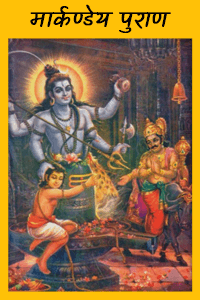Read Markndey Puran in English

Introduction:
The Markandeya Puran is one of the 18 sacred Puranas in Hinduism.
It is attributed to Sage Markandeya, who narrated it to Krausthi.
Known for its detailed exploration of various deities like Indra, Surya, Agni, and Vayu, along with discussions on daily rituals and household duties.
The Puran is named after Sage Markandeya, who occupies the seventh position in the list of Puranas.
Content:
Provides elaborate descriptions of the glory of Goddess Bhagavati.
Features numerous narratives, including the stories of Dattatreya, Atri and Anasuya, Durga Saptashati, and the tale of King Harishchandra.
Presents detailed accounts of the manifestations of the trinity of Goddesses - Mahakali, Mahalakshmi, and Mahasaraswati.
Structure and Length:
Comprises 137 chapters and 9000 shlokas, making it relatively shorter compared to other Puranas.
Chapters 1 to 42 are narrated by Sage Jaimini, while chapters 43 to 90 are attributed to Sage Markandeya.
Sage Markandeya's discourse gives the Puran its name.
Themes and Teachings:
Explores moral, spiritual, social, and physical aspects essential for human welfare.
Describes the natural beauty and splendor of Bharatvarsha (India).
Promotes righteousness and imparts wisdom through narratives and teachings.
Significance:
Emphasizes the significance of righteousness and the eradication of sin.
Contains the complete narration of Durga Saptashati, considered highly auspicious and beneficial for devotees.
Revered as a Shakta scripture due to its detailed depiction of the glory of Goddess Chandi.
Key Stories:
Highlights the birth of Surya (the Sun) and the origins of the 'Om' mantra.
Chronicles the life of Sage Markandeya and the profound impact of listening to the Puran.
Morality and Ethics:
Stresses the importance of fulfilling one's duties and leading a righteous life.
Presents exemplary moral tales, including the sacrifice of King Harishchandra.
Devotional Aspect:
Listening to or reading the Markandeya Puran is believed to bestow spiritual liberation and fulfill desires related to dharma, artha, kama, and moksha.